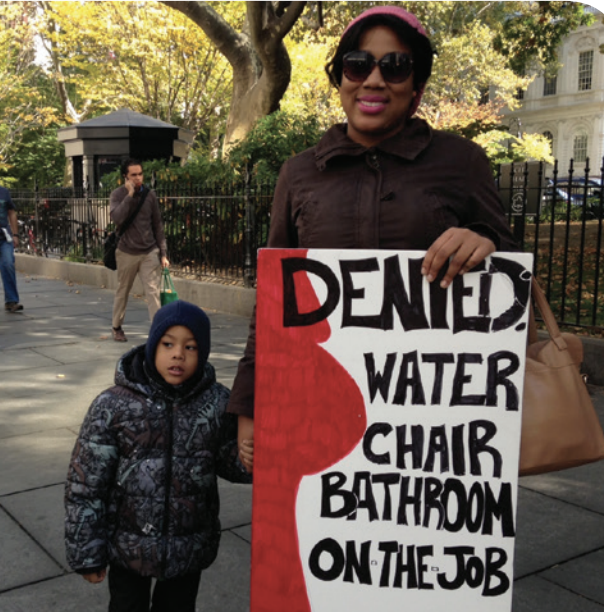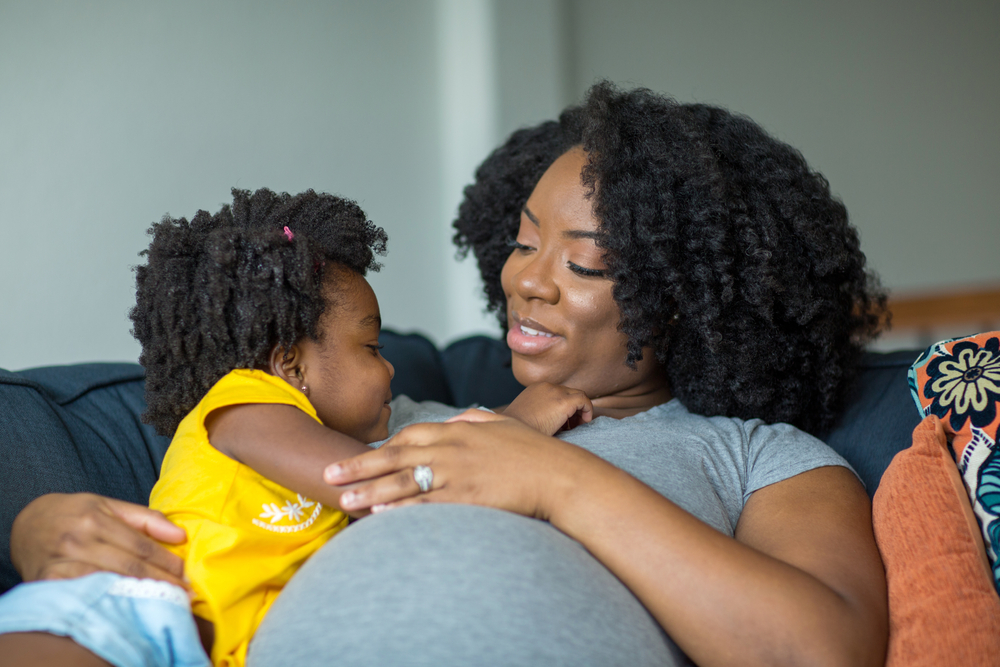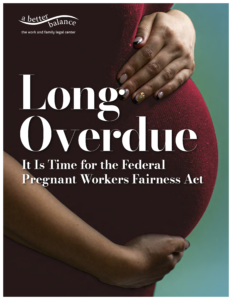Our Issues
Pregnant Workers Fairness
Every pregnant worker deserves the opportunity to work to support their family without risking the health of their pregnancy. Yet pregnant workers, especially those in low-wage and physically demanding jobs, have been forced to choose between their health and a paycheck for far too long.
We have helped pregnant workers across the country secure and enforce a clear right to reasonable workplace accommodations–the same right afforded to workers with disabilities under federal law – including by leading the campaign to successfully pass the federal Pregnant Workers Fairness Act.

The Federal Pregnant Workers Fairness Act
We are proud to have launched and led advocacy efforts to pass the Pregnant Workers Fairness Act (PWFA) which makes it clear that employers must provide reasonable accommodations to allow workers to continue working while maintaining healthy pregnancies. In 2012, with an op-ed in The New York Times, we called for legislative change, directly resulting in Congress introducing the Pregnant Workers Fairness Act. Since then, we worked to lift up the voices of workers and make the case for a federal law.
A Better Balance has led the charge year after year in advancing both state-level protections for pregnant workers across the country, as well as in pushing for the federal Pregnant Workers Fairness Act’s passage in Congress. We fought tirelessly alongside a diverse coalition of partners and stakeholders, worker advocates, business groups, faith leaders, and maternal health advocates as we made the case for this critical law on Capitol Hill and beyond. The PWFA was sponsored by Rep. Jerrold Nadler and Rep. John Katko in the House and Sen. Bob Casey and Sen. Bill Cassidy in the Senate.
In December 2022, Congress passed the Pregnant Workers Fairness Act as part of the FY 2023 omnibus spending package and President Biden signed it into law on December 29, 2022, marking a historic civil rights victory. In 2023, we sent a detailed comment to the Equal Employment Opportunity Commission providing a host of recommendations for how the EEOC can provide further clarity for workers and employers on the law, grounded in our legal expertise, as well as direct knowledge from hundreds of workers from 44 states as to how the new law has been working.
We are proud to have launched and led this movement to make stronger protections for pregnant and postpartum workers a reality nationwide. Learn more about the federal Pregnant Workers Fairness Act by visiting The Pregnant Workers Fairness Act: What You Should Know.
As part of the PWFA campaign, we produced numerous documents make the case for the law and explain the need for reform. For a full list of resources related to the federal Pregnant Workers Fairness Act campaign, visit here.
- Fact Sheet: The Pregnant Workers Fairness Act
- Fact Sheet: The Pregnant Workers Fairness Act Legal Backgrounder
- Fact Sheet: Bill Explainer — The Pregnant Workers Fairness Act
- FAQs: The Pregnant Workers Fairness Act
- Fact Sheet: Advancing Equity in Maternal and Infant Health through the Pregnant Workers Fairness Act
- The Women Who Inspired the Movement for the Pregnant Workers Fairness Act
- VIDEO: Pregnant Workers Share Their Stories & Call on the Senate to Pass the Pregnant Workers Fairness Act
- See our federal PWFA resources page for a list of op-eds written by ABB Community Advocates.
- Winning The Pregnant Workers Fairness Act: An Inside Story and Lessons Learned from the Decade-Long Fight for Justice, Fairness, and Equality (2023)
- Centering the Experiences of Black Mamas in the Workplace: How The Pregnant Workers Fairness Act Can Support Black Maternal Health (2022)
- From Statehouses to Congress – Paving the Way for the Federal Pregnant Workers Fairness Act (2022)
- Long Overdue: It Is Time for the Federal Pregnant Workers Fairness Act (2019)
- Pregnant and Jobless (2015)
State and Local PWFA Laws
As of December 2020, 30 states and 5 cities have stronger protections for pregnant workers in need of workplace accommodations. These protections often pass with bipartisan, and often unanimous, support. A Better Balance helps these campaigns with legislative drafting, messaging, and enforcement, while also leading campaigns in areas where we have support on the ground. Click here for an interactive map of states that have these critical protections.
- Fact Sheet: State Pregnant Workers Fairness Laws
Enforcing the Rights of Pregnant Workers
A Better Balance has provided legal assistance to thousands of pregnant workers who were pushed off the job while pregnant, or who felt forced to risk their health because their employer refused to provide them with a modest accommodation, including high-profile strategic litigation victories to advance systemic change. We are not afraid of taking on industry giants, like Walmart and Amazon, and are proud of what we have accomplished on behalf of our clients, from working with the Department of Justice to force city-wide policy changes in Florence, Kentucky, to accomplishing sweeping reforms at the Museum of Modern Art (MOMA). We also file amicus briefs in support of pregnant workers and pregnancy accommodation laws.
- Questions about your rights while pregnant or post-childbirth? ABB has developed groundbreaking emergency Pregnancy, Workplace Rights, & COVID-19 resources. And you can visit our Workplace Rights Hub, a state by state legal guide to asserting your rights.
Workplace Rights Hub
250,000
Estimated pregnant workers every year who are denied requests for accommodations, and even more don’t bother asking, for fear of retaliation
62%
Of Americans have personally seen pregnancy discrimination in the workplace












